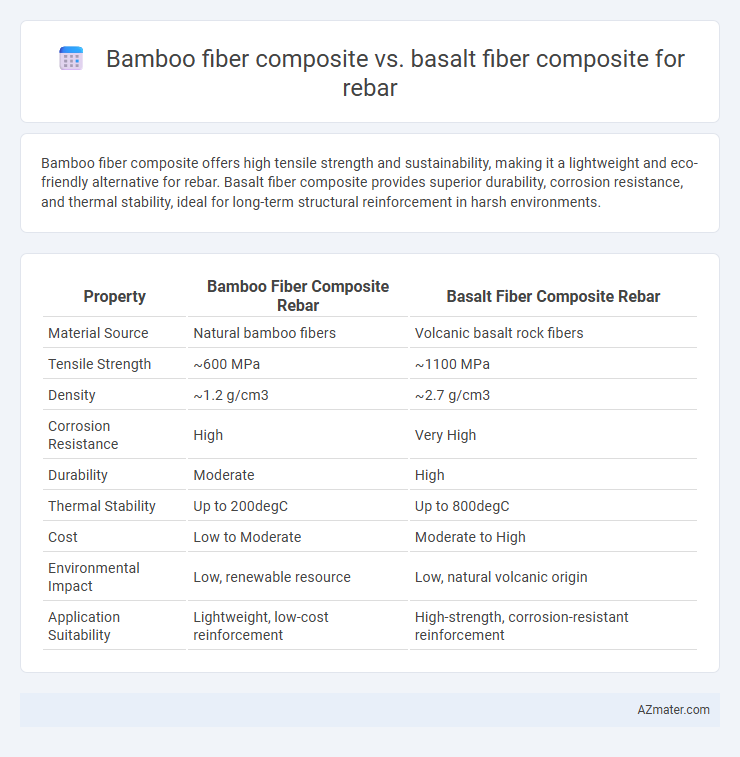Bamboo fiber composite offers high tensile strength and sustainability, making it a lightweight and eco-friendly alternative for rebar. Basalt fiber composite provides superior durability, corrosion resistance, and thermal stability, ideal for long-term structural reinforcement in harsh environments.
Table of Comparison
| Property | Bamboo Fiber Composite Rebar | Basalt Fiber Composite Rebar |
|---|---|---|
| Material Source | Natural bamboo fibers | Volcanic basalt rock fibers |
| Tensile Strength | ~600 MPa | ~1100 MPa |
| Density | ~1.2 g/cm3 | ~2.7 g/cm3 |
| Corrosion Resistance | High | Very High |
| Durability | Moderate | High |
| Thermal Stability | Up to 200degC | Up to 800degC |
| Cost | Low to Moderate | Moderate to High |
| Environmental Impact | Low, renewable resource | Low, natural volcanic origin |
| Application Suitability | Lightweight, low-cost reinforcement | High-strength, corrosion-resistant reinforcement |
Introduction: The Rise of Sustainable Composite Rebars
Bamboo fiber composite and basalt fiber composite have emerged as leading materials in the sustainable rebar market due to their renewable properties and high strength-to-weight ratios. Bamboo fiber offers rapid renewability and excellent tensile strength, making it ideal for eco-friendly construction applications, while basalt fiber provides superior corrosion resistance and durability in harsh environments. The increasing demand for green infrastructure drives innovation in composite rebars, positioning bamboo and basalt fibers as pivotal solutions for reducing carbon footprints in reinforced concrete structures.
Overview of Bamboo Fiber Composites
Bamboo fiber composites for rebar offer excellent tensile strength and eco-friendly properties, making them a sustainable alternative to traditional materials. These composites exhibit high durability, good corrosion resistance, and lightweight characteristics, enhancing structural performance in reinforced concrete applications. The natural fiber's renewable origin and rapid growth cycle contribute to reduced carbon footprint and improved environmental impact compared to synthetic fiber composites.
Overview of Basalt Fiber Composites
Basalt fiber composites for rebar exhibit high tensile strength, excellent corrosion resistance, and superior durability in concrete structures, outperforming traditional steel reinforcement. These composites are derived from natural volcanic rock, offering an eco-friendly alternative with significantly lower environmental impact and thermal stability up to 600degC. Their lightweight nature combined with high mechanical performance makes basalt fiber composite rebar ideal for infrastructure seeking longevity and reduced maintenance costs.
Mechanical Properties: Strength and Flexibility
Bamboo fiber composites exhibit high tensile strength and excellent flexibility, making them suitable for lightweight rebar applications with good energy absorption capacity. Basalt fiber composites offer superior mechanical strength and stiffness, providing enhanced load-bearing capacity and durability under heavy stress conditions. Compared to bamboo, basalt fibers demonstrate greater resistance to environmental degradation and sustained mechanical performance in structural reinforcement.
Durability and Corrosion Resistance
Bamboo fiber composites exhibit moderate durability and natural resistance to corrosion but can degrade faster when exposed to moisture without proper treatment, limiting their long-term use in rebar applications. Basalt fiber composites offer superior durability and exceptional corrosion resistance due to their inorganic composition, making them highly suitable for reinforcing concrete in harsh environments. The inherent strength retention and minimal chemical degradation of basalt fiber composites ensure extended service life compared to bamboo fiber alternatives.
Environmental Impact and Sustainability
Bamboo fiber composite rebar offers superior environmental benefits due to its rapid renewability, carbon sequestration capabilities, and biodegradability, making it a highly sustainable reinforcement option. Basalt fiber composite rebar, derived from natural volcanic rock, provides durability and corrosion resistance with a relatively low environmental footprint, but its production involves higher energy consumption compared to bamboo. Evaluating life cycle assessments reveals that bamboo fiber composites significantly reduce CO2 emissions and resource depletion, positioning them as an eco-friendlier alternative in sustainable construction.
Manufacturing Processes and Cost Efficiency
Bamboo fiber composite rebars are manufactured using processes such as pultrusion and resin impregnation, offering lower energy consumption and faster production times compared to basalt fiber composites, which require high-temperature melting and spinning techniques. The manufacturing cost of bamboo fiber composites is generally lower due to abundant raw materials and simpler processing, while basalt fibers involve higher expenses linked to energy-intensive production and raw material extraction. Cost efficiency in bamboo fiber composites makes them a competitive alternative for sustainable rebar applications, although basalt fiber composites provide superior mechanical properties justifying their higher manufacturing costs in demanding structural roles.
Performance in Concrete Reinforcement Applications
Bamboo fiber composite rebar exhibits high tensile strength and excellent flexibility, making it suitable for seismic-resistant concrete structures, while offering biodegradability and lower weight compared to traditional materials. Basalt fiber composite rebar provides superior corrosion resistance, high thermal stability, and increased durability under aggressive environmental conditions, enhancing the longevity of reinforced concrete infrastructure. Both materials improve concrete bonding properties, but basalt fiber composite generally outperforms bamboo fiber composite in load-bearing capacity and long-term structural performance.
Challenges and Limitations of Each Composite
Bamboo fiber composites face challenges such as moisture absorption leading to dimensional instability and reduced durability in rebar applications, as well as variability in fiber quality affecting mechanical performance. Basalt fiber composites exhibit limitations including higher production costs and difficulties in achieving consistent fiber-matrix bonding, which can compromise rebar strength and longevity. Both composites require advanced surface treatments and processing methods to overcome these obstacles and ensure reliable structural reinforcement.
Conclusion: Choosing the Ideal Fiber Composite for Rebar
Bamboo fiber composite offers excellent sustainability and lightweight properties, making it suitable for eco-friendly construction projects. Basalt fiber composite provides superior strength, durability, and corrosion resistance, ideal for high-load and harsh environmental conditions. Selecting the ideal fiber composite for rebar depends on balancing environmental impact, mechanical performance, and project-specific requirements.

Infographic: Bamboo fiber composite vs Basalt fiber composite for Rebar
 azmater.com
azmater.com